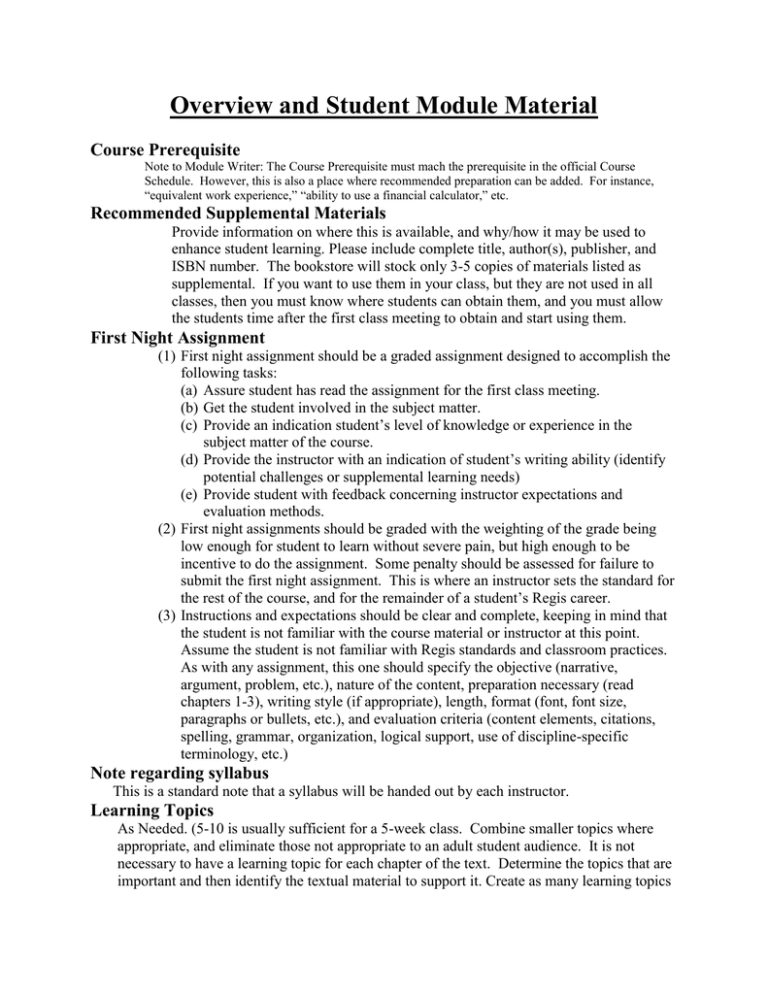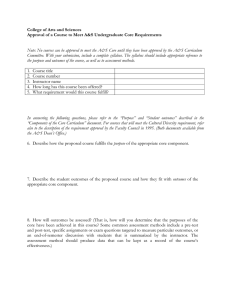Overview and Student Module Material Course Prerequisite
advertisement

Overview and Student Module Material Course Prerequisite Note to Module Writer: The Course Prerequisite must mach the prerequisite in the official Course Schedule. However, this is also a place where recommended preparation can be added. For instance, “equivalent work experience,” “ability to use a financial calculator,” etc. Recommended Supplemental Materials Provide information on where this is available, and why/how it may be used to enhance student learning. Please include complete title, author(s), publisher, and ISBN number. The bookstore will stock only 3-5 copies of materials listed as supplemental. If you want to use them in your class, but they are not used in all classes, then you must know where students can obtain them, and you must allow the students time after the first class meeting to obtain and start using them. First Night Assignment (1) First night assignment should be a graded assignment designed to accomplish the following tasks: (a) Assure student has read the assignment for the first class meeting. (b) Get the student involved in the subject matter. (c) Provide an indication student’s level of knowledge or experience in the subject matter of the course. (d) Provide the instructor with an indication of student’s writing ability (identify potential challenges or supplemental learning needs) (e) Provide student with feedback concerning instructor expectations and evaluation methods. (2) First night assignments should be graded with the weighting of the grade being low enough for student to learn without severe pain, but high enough to be incentive to do the assignment. Some penalty should be assessed for failure to submit the first night assignment. This is where an instructor sets the standard for the rest of the course, and for the remainder of a student’s Regis career. (3) Instructions and expectations should be clear and complete, keeping in mind that the student is not familiar with the course material or instructor at this point. Assume the student is not familiar with Regis standards and classroom practices. As with any assignment, this one should specify the objective (narrative, argument, problem, etc.), nature of the content, preparation necessary (read chapters 1-3), writing style (if appropriate), length, format (font, font size, paragraphs or bullets, etc.), and evaluation criteria (content elements, citations, spelling, grammar, organization, logical support, use of discipline-specific terminology, etc.) Note regarding syllabus This is a standard note that a syllabus will be handed out by each instructor. Learning Topics As Needed. (5-10 is usually sufficient for a 5-week class. Combine smaller topics where appropriate, and eliminate those not appropriate to an adult student audience. It is not necessary to have a learning topic for each chapter of the text. Determine the topics that are important and then identify the textual material to support it. Create as many learning topics as necessary to adequately cover all information to be presented in this class. The number of learning topics does not correspond in to the weekly course format (for example, if the course runs for five weeks, you may write eleven learning topics if necessary to cover the material). You should note, in the module (see section below) and in your sample syllabus, which night each learning topic is to be addressed. Learning Topic #_ Description/Illustration Include a brief description of the Learning Topic and discussion of how it works to fulfill course objectives. (A course objective is the overall purpose of the course – i.e. benefit to the student. This is not the same as a learning outcome or topic outcome, which will be discussed below.) Learning Outcome We have in the past used the terms Topic Outcome, Learning Outcome, and Learning Objective to mean the same thing – what the student will be able to do as a result of satisfactorily completing this unit or segment of learning. For all modules in Business, we will henceforth use the term Learning Outcome. The outcome is stated in terms of an action or behavior and that action should help to define the means of assessing the student’s learning. One may not be able to evaluate a student’s knowledge, but you may be able to assess their ability to demonstrate that knowledge through a test, writing a paper that contains certain elements, or presenting an argument. (More on this in a later section.) If the scope of your Outcomes is too narrow, you will end up with many statements and assessments of minutia. If they are too broad, you will have difficulty evaluating whether the outcome has been achieved. The Outcome should be specific enough to measure (evaluate), and general enough that the learning can be generalized to other situations. You may want to refer to Bloom’s Taxonomy or other resource for possible action verbs to use in your outcomes statements. . Assessed (Graded) Deliverables (May be changed by individual Facilitators as described in the syllabus.) Those things (papers, presentations, activities) that will be graded. Students often want to have some idea of the workload expectations for a course. In all cases, that should total approximately 15 hours of work outside of class each week (approximately 95 hours including class time (75 hours out of class and 20 in) for a 3-credit-hour course). A Simple list will do. i.e. First night assignment – paper 2 case studies (written and presented in class) 1 interview with a professional in the field (written report) 1 debate on team with 1 other student View an assigned movie (to be rented from a video store) and present 5 minute oral report to class. Team project (3-4 person team) for final project – 10+ page paper and oral presentation to class.


